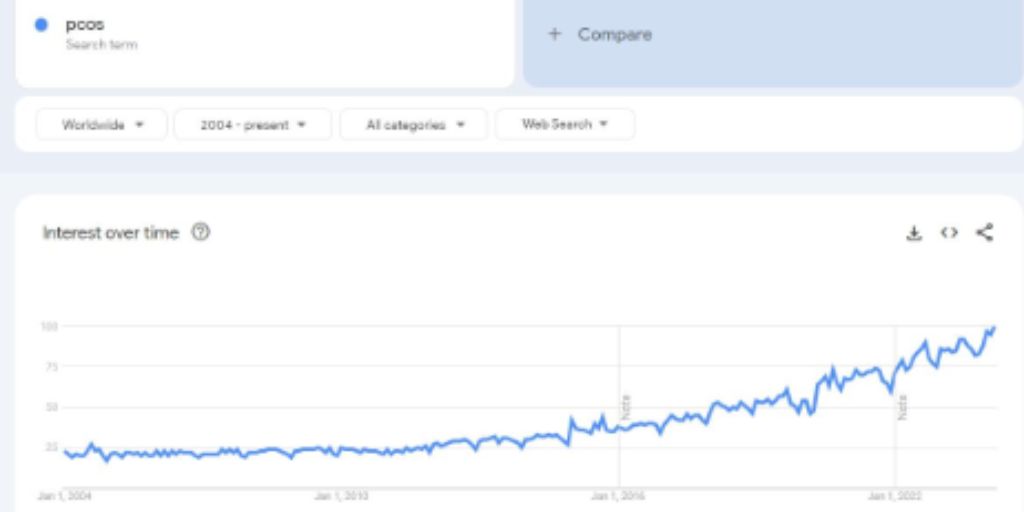
- Global Google searches for PCOS have hit an all-time high since records began in 2004.
- A diet rich in lean protein, fiber, and fatty acids could help alleviate PCOS symptoms.
- Adopting a Mediterranean, vegan, or low-carb diet can also help with PCOS symptoms.
Google searches related to Polycystic Ovary Syndrome (PCOS) reached an all-time high in April 2024 globally, indicating a growing concern and interest in understanding and managing this condition.
PCOS is a widespread hormonal disorder that mainly affects women between the ages of 12 and 51, leading to symptoms such as weight gain, insulin resistance, and hormonal imbalances. Fortunately, dietary modifications can significantly mitigate these symptoms and enhance overall well-being.
With this in mind, Global Healthcare Innovator Aster DM Healthcare has put together a list of the top foods to include in your diet that could help combat symptoms of PCOS.
Try to incorporate foods containing the following into your diet:
- Omega-3 fatty acids
- Vitamin D
- Inositol
- Magnesium
- Fiber
- Lean protein
Foods containing omega-3 fatty acids:
Omega-3 fatty acids are vital for hormone function and reducing inflammation. They’re found in oily fish such as mackerel, salmon, and herring. But if you don’t like fish, adding one tablespoon of flaxseed oil to your salads can fulfill your daily alpha-linolenic acid (ALA) needs.
Vegan alternatives:
Chia seeds, flaxseed oil, Brussels sprouts, walnuts, and algal oil are excellent plant-based sources of omega-3.
Foods containing vitamin D:With up to 85% of women with PCOS exhibiting low vitamin D levels, consuming foods that can bolster vitamin D levels is crucial for blood sugar regulation. Egg yolks, liver, and cheese are excellent sources.
Vegan alternatives:
Mushrooms, fortified breakfast cereals, nuts, rice milk, and fortified orange juice. Additionally, exposing your skin to sunlight for 10-30 minutes daily can provide a significant amount of vitamin D.
Foods containing inositol:
Inositol has been shown in studies to be as effective as metformin for treating PCOS symptoms, and with less side effects.
Fresh fruits (particularly citrus fruits), beans, grains, and nuts are excellent sources of inositol, with fresh green beans being especially rich in this nutrient.
Foods high in magnesium:
Magnesium plays a crucial role in blood sugar control and insulin metabolism. When taken alongside vitamins K and D, these minerals can be especially beneficial for women with PCOS. Foods such as spinach, almonds, black beans, and avocado are all magnesium-rich.
Vegan alternatives:
Most nuts, seeds, and leafy greens are packed with magnesium, making them ideal for anyone following a plant-based diet.
Foods rich in fiber:
Fiber aids digestion and helps maintain a healthy weight by promoting fullness and reducing insulin spikes.
Berries, lentils, and quinoa are excellent sources of dietary fiber.
Lean protein foods:
Proteins are essential for the body’s repair, muscle maintenance, and overall health, particularly in managing conditions like PCOS, where maintaining a healthy weight and stabilizing insulin levels are crucial.
Lean meats: Including chicken breast, turkey, and lean cuts of beef offer high-quality protein with minimal saturated fat, helping support muscle maintenance and satiety without exacerbating insulin resistance.
Fish: Options like salmon, cod, and tuna not only provide lean protein but also contain omega-3 fatty acids, which are beneficial for reducing PCOS-associated inflammation.
Vegan protein alternatives:
Legumes, tofu, tempeh, and quinoa offer high-quality plant-based proteins that support blood sugar regulation and provide essential nutrients for managing PCOS.
To manage PCOS symptoms effectively, many health experts suggest considering various dietary patterns. Options such as the Mediterranean diet, a vegan diet, or a low-carb diet are often recommended. These diets are great because each emphasizes the importance of whole foods, healthy fats, and lean proteins while advising against consuming processed foods and sugars. However, it’s important for individuals to select a diet that aligns with their lifestyle and personal preferences, focusing on one approach rather than attempting to combine different diets.
Commenting on this information, a spokesperson from Aster DM Healthcare says:
“Implementing simple yet significant dietary adjustments can pave the way for a marked improvement in managing PCOS symptoms. Choosing the right diet tailored to one’s needs and preferences can make a substantial difference in achieving hormonal balance and enhancing overall health. Be sure to talk to your doctor or nutritionist before making any drastic diet changes.”












